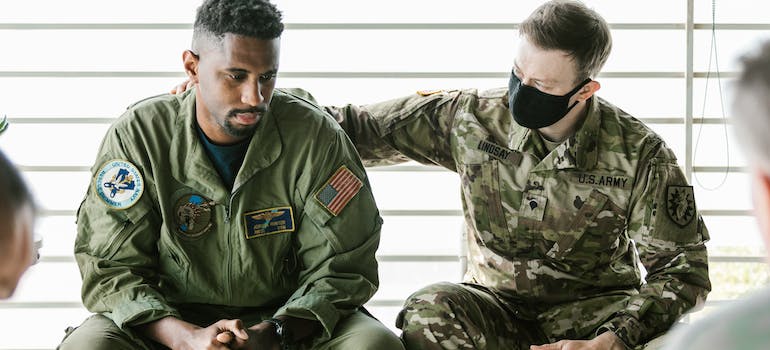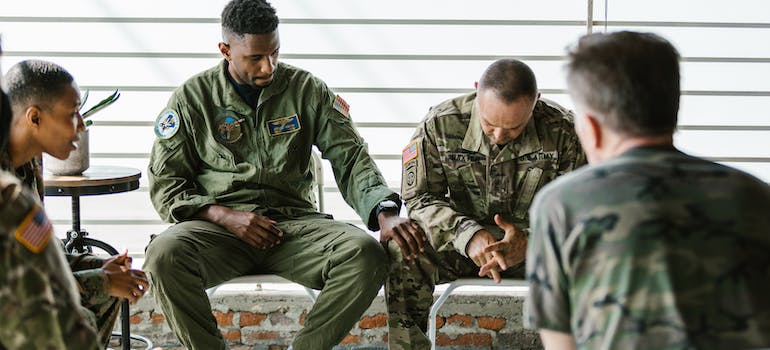In West Virginia, where the veteran community is integral to the state’s identity, the impact of alcoholism is profound. It affects not only the individuals struggling with addiction but also their families and the wider community. Alcoholism in West Virginia veterans is a pressing concern that calls for immediate attention. Veterans in West Virginia face unique challenges that predispose them to alcohol addiction, including the difficult transition from military to civilian life, PTSD, and chronic pain. These factors contribute significantly to the development of alcohol dependency among our veterans. The recovery from alcohol addiction often starts at a detox center in West Virginia. Harmony Ridge shares risk factors and treatment options for alcohol dependency to help those who have served our country lead healthier and happier lives.
Risk Factors for Alcoholism Among WV Veterans
Understanding the risk factors for alcoholism is crucial in addressing the needs of veterans suffering from alcoholism. For many veterans in West Virginia, alcoholism is not just about addiction; it’s connected to a complicated mix of other problems that make their struggle even harder.

These issues include:
- Post-Traumatic Stress Disorder (PTSD): Many veterans return home with PTSD, a condition triggered by experiencing or witnessing traumatic events. The nightmares, flashbacks, and anxiety that characterize PTSD can lead veterans to seek solace in alcohol as a way to numb their pain or cope with sleep troubles.
- Chronic Pain: Veterans who have physical injuries from their service can end up with long-lasting pain. Sometimes, dealing with this pain makes them start drinking more alcohol as they try to use it to ease their discomfort.
- Transition Challenges: Adapting to civilian life poses significant challenges for many veterans. The loss of a structured military environment, difficulty finding employment, and feeling disconnected from civilian peers can create a sense of isolation and a loss of identity. Alcohol can temporarily fill this void, offering a false sense of relief or belonging.
Other key risk factors may include:
- Limited Access to Resources: In some areas of West Virginia, veterans may have limited access to healthcare and mental health services, making it more challenging to get the help they need.
- Social and Family Stress: Relationship problems, family responsibilities, and societal expectations can add to the stress veterans face, increasing their vulnerability to alcohol misuse.
- History of Substance Abuse: Veterans with a prior history of substance abuse are at a heightened risk of falling back into old habits when faced with stressful life changes.

Understanding Alcohol Addiction
This addiction, or alcohol use disorder, is not just a habit but a medical condition where controlling drinking habits becomes increasingly difficult despite negative consequences.
The progression of alcohol addiction often starts subtly. Initially, drinking may just be a mere stress reliever or social activity. However, this can evolve into a dependency, marked by a deep-seated craving for alcohol, overpowering other life aspects.
Signs of alcohol addiction
Some of the most common signs of alcohol dependency are:
- Building tolerance, needing more alcohol for the same effect
- Experiencing withdrawal symptoms like anxiety or shakiness when not drinking
- Engaging in risky behaviors, such as drinking and driving
- Persisting in drinking despite knowing its negative effects on health and life
For veterans, the stakes are higher. Alcohol addiction can worsen mental health issues like PTSD, trapping them in a destructive cycle. It also leads to physical health problems, including liver disease and heart issues, and increases the risk of accidents.
The effects go beyond just the person and impact their relationships, jobs, and financial stability. It’s a heavy load for both the individual and the community they’re part of.

Detox and Rehabilitation Services for Alcoholism in West Virginia Veterans
Detoxification is a necessary step in dealing with physical dependence on alcohol. It’s a tough phase where the body has to get used to working without alcohol, which can often cause withdrawal symptoms. The right detox center not only offers medical care to handle these symptoms safely but also provides emotional support to help veterans deal with the psychological side of withdrawal.
Detox is not just a physical cleanse; it prepares individuals for the following rehabilitation stages. Good detox centers combine medical care with compassionate support, acknowledging veterans’ unique experiences and needs, including service-related traumas.
Fighting the Disease of Addiction
Battling the disease of addiction is a multifaceted challenge, especially for veterans. This battle is not just against physical dependency; it involves overcoming the psychological grip that addiction holds.
The physical aspect of addiction involves the body’s reliance on alcohol. Long-term alcohol use alters brain chemistry, leading to dependency and withdrawal symptoms when not drinking. This physical dependence can be powerful and requires medical intervention to overcome safely.
The psychological aspect is equally challenging. Addiction affects how veterans think, feel, and behave. It often serves as a coping mechanism for underlying issues such as PTSD, stress, or depression. Breaking free from addiction means not only addressing the physical dependence but also these underlying psychological factors.
Recovery from addiction involves:
- Understanding the root causes of addiction
- Developing new coping strategies to deal with stress and trauma
- Rebuilding a healthy lifestyle that supports sobriety
For veterans, this process may also involve addressing service-related experiences that contribute to their addiction. It’s a process that requires time, patience, and often professional support. It’s more than just stopping alcohol consumption; it’s about transforming one’s life and mindset. With the right support and determination, recovery is possible.

Alcohol Addiction Treatment Options for Veterans in West Virginia
Finding the best substance abuse treatment in West Virginia is very important for veterans who are starting their journey to recovery. The state has different treatment options that are designed to help people with addiction. They can be adjusted to fit the specific needs of each person.
These treatment options include:
- Residential Treatment Programs, which provide an immersive environment where veterans can focus entirely on recovery. These programs offer structured care, including therapy, group sessions, and medical support, in a setting removed from daily stressors and triggers. They are particularly beneficial for those with severe addiction or co-occurring mental health conditions.
- Outpatient Services, which offer flexibility, allowing veterans to attend treatment sessions while maintaining their daily responsibilities. This option is ideal for those with less severe addiction or as a step-down from residential treatment. Outpatient programs include individual counseling, group therapy, and support for managing relapse.
- Specialized Veteran Programs, which are designed to address the unique experiences of military service. These programs often incorporate treatments for PTSD and other service-related issues, recognizing the connection between these problems and substance abuse.
Additional options include:
- Support Groups, providing a space for shared experiences and encouragement
- Holistic Therapies, focusing on overall well-being, including physical health, mental clarity, and emotional stability
Each option caters to different stages and recovery needs. This shows that there is no one-size-fits-all solution. The key is finding the right combination of therapies and approaches that match the individual’s experiences, challenges, and goals.
Partial Hospitalization Programs (PHP)
In West Virginia, partial hospitalization programs (PHP) play a vital role in the continuum of care for veterans battling alcohol addiction. These programs provide a unique blend of intensive treatment and flexibility, making them ideal for those who need more than outpatient care but less than full-time residential treatment.
PHPs offer structured therapy sessions, both individual and group-based, which delve into understanding addiction, developing coping strategies, and preventing relapse. Alongside therapy, medical monitoring is provided, especially crucial for veterans in the early stages of recovery or dealing with co-occurring health issues.
A key advantage of PHPs is their ability to allow participants to live at home. This setup particularly benefits veterans balancing treatment with family responsibilities or work commitments. It enables them to apply the skills learned in therapy to real-world situations, facilitating a smoother transition to everyday life.
Partial hospitalization program in West Virginia thus offers a middle ground, combining the intensity of residential treatment with the autonomy of outpatient services. For veterans, this can mean a more manageable and effective path to recovery, maintaining a connection to their community while receiving the necessary support to overcome addiction.

Medication-Assisted Treatment (MAT)
Medication assisted treatment in West Virginia is a crucial component in treating alcohol addiction, especially for veterans. MAT combines medication with counseling and behavioral therapies to provide a “whole-patient” approach to the treatment of substance use disorders.
The medications used in MAT are designed to alleviate withdrawal symptoms and reduce cravings, which can be particularly intense in the early stages of recovery. This approach helps stabilize individuals, allowing them to focus more effectively on treatment counseling and behavioral aspects.
The type and dosage of medication are tailored to each individual’s specific needs, often considering their medical history and the severity of their addiction. The goal is to create the most effective treatment plan that supports long-term recovery.
Incorporating MAT into the treatment process offers several benefits:
- Increases the likelihood of staying in treatment
- Reduces the potential for relapse
- Helps address underlying health issues related to alcohol abuse
For veterans in West Virginia, medication-assisted treatment can be particularly beneficial. It addresses the physical aspects of addiction, often compounded by injuries or health issues from their service time. By mitigating these physical challenges, MAT allows veterans to engage more fully in other aspects of treatment, such as therapy and skill-building, leading to a more comprehensive and effective recovery process.
Alcohol Addiction and Co-occurring Disorders
Addressing co-occurring disorders is a critical part of the recovery process for many veterans dealing with alcohol addiction. Dual diagnosis treatment is tailored to meet the unique challenges posed by the simultaneous presence of substance abuse and mental health disorders.
Co-occurring disorders can include:
These conditions often interact with alcohol addiction in complex ways, each exacerbating the other. For instance, a veteran might use alcohol to self-medicate for PTSD symptoms, while the alcohol abuse, in turn, aggravates the PTSD.
Effective dual diagnosis treatment involves:
- Comprehensive assessment to understand the full scope of the individual’s challenges
- Integrated treatment plans that address both the addiction and the mental health disorder simultaneously
- A combination of therapies, including behavioral therapy, counseling, and, where appropriate, medication
The best dual diagnosis treatment in WV recognizes the interconnected nature of these disorders. It aims to provide a holistic approach to treatment, ensuring that both the mental health condition and the substance abuse issue are treated concurrently.
Therapeutic Options for Alcohol Addiction Among WV Veterans
In treating alcoholism in West Virginia veterans, it’s important to remember that therapy is also an option, and it can significantly aid recovery. Individual and group therapies both provide a safe space for veterans to explore and heal from the psychological aspects of addiction.
Individual therapy offers personalized attention, allowing veterans to work through personal challenges and traumas in a confidential setting. Techniques like cognitive-behavioral therapy (CBT) help in altering negative thought patterns and behaviors associated with addiction.
On the other hand, group therapy helps treat addiction by providing a support network and a platform for shared experiences. It fosters a sense of community and mutual support. It’s a space where veterans can share their experiences and challenges, learn from each other, and build a support network crucial for long-term recovery.
Therapy aids in overcoming addiction and supports the development of coping strategies, relapse prevention skills, and a deeper understanding of the root causes of substance abuse.

Fight Against Alcoholism in West Virginia Veterans
Therapy plays a crucial role in treating alcoholism in West Virginia veterans. Whether individual counseling, group sessions, or specialized therapies, these interventions offer the emotional and psychological support necessary for a successful recovery. It’s an opportunity to heal not just from addiction but also from the underlying issues that often accompany it. As veterans transition from treatment to everyday life, the skills and insights gained from therapy become invaluable tools. They help maintain sobriety, rebuild relationships, and pursue a fulfilling post-service life. With the right treatment, veterans can overcome addiction and embark on a journey toward a healthier, more stable future.



